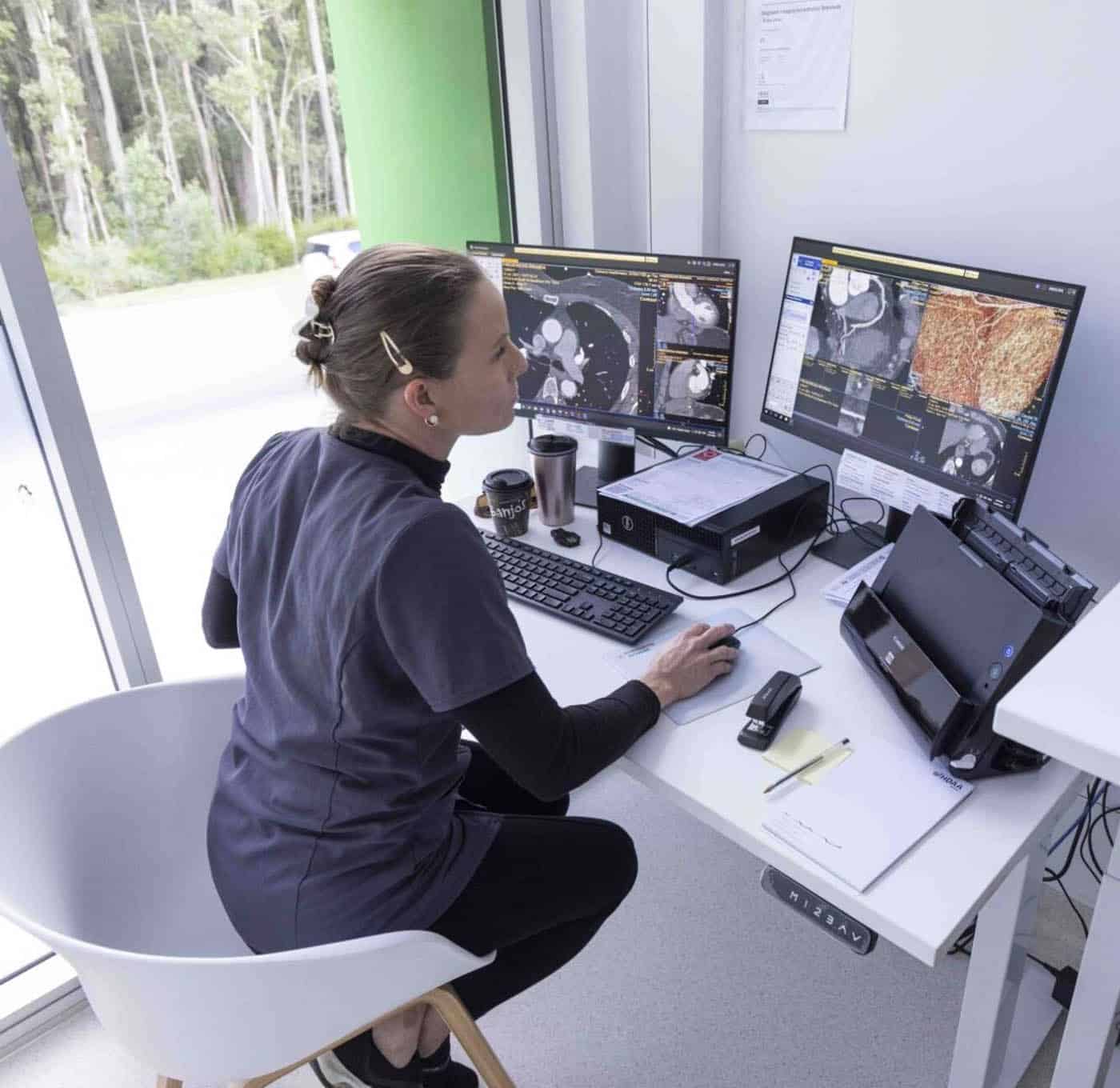Your doctor has recommended you undergo a test called a CT coronary angiography (CTCA).
You might not have heard this medical term before now and may be feeling unsure about the nature of the test.
This information sheet will outline what the test is and what preparations and risks are involved, if any.
After you read this information sheet, you might still have questions. If you do, please contact the team at Heart HQ. We’re here to help.
What’s a CTCA?
A CTCA is one of the best ways to assess the condition of your coronary arteries, heart muscle and heart valves. As a scanning test, it’s far less invasive than some of the procedures designed to check your heart health. It takes advantage of the latest advances in high resolution scanning to create detailed and accurate images of the heart, lungs, and arteries in just seconds. That means an easier, non-invasive diagnosis of the cause of symptoms and earlier detection of underlying or developing problems.
The coronary arteries supply blood to the heart muscle, and plaque build-up in these vessels is responsible for most heart attacks. Hence early detection and treatment with medications and/or stenting is important. The benefit of a CTCA is its ability to demonstrate the extent, type (hard or soft) and distribution of plaque (atherosclerosis) within the coronary arteries.
This test is mainly used for patients with suspected coronary artery disease who have experienced symptoms (such as chest discomfort) and are considered to be at low to intermediate risk of the disease based on standard risk assessment criteria.
Some of our cardiologists have a special interest in cardiovascular CT, especially in patients presenting with chest pain to enable:
- risk stratification—to help target further treatments, e.g. stenting of blockages
- early identification of plaque—to enable early treatment with medications
- coronary artery calcium scoring—to help guide further investigation and therapy.
What’s a CT calcium score?
By detecting calcium deposits in the artery walls, the CT scanner can detect the presence of blockages and plaque in your heart arteries that may not yet be severe enough to show up on other tests (e.g. a stress test). A calcium score will be generated from a low radiation CT scan of your heart. This score will be used in combination with other cardiovascular risk factors such as high blood pressure and cholesterol levels to help determine what further cardiac tests and or treatments are necessary.
What happens in a CTCA test?
Before your appointment
You may need to take a medication called a beta-blocker on the day before the test and the morning of the test to help steady your heart rate so a clear picture of your coronary arteries will be obtained. This will be prescribed by your treating cardiologist.
You should not eat any food for two hours before your appointment. You can continue to drink water and stay well hydrated.
Do not consume any products containing caffeine for 24 hours prior to your test. This includes tea, coffee, chocolate, energy drinks and most soft drinks.
Do not exercise or perform strenuous activity prior to your test. Continue to take your normal medication on the day of your appointment, unless you are advised otherwise.
Do not take any medication for erectile dysfunction for 72 hours prior to your appointment.
During the appointment
The test is broken up into three stages—preparation, scanning and reporting.
Preparation
Initially, your heart rate will be checked using an electrocardiogram (ECG) machine. One of the specialist doctors (a CTCA-trained cardiologist) will supervise your test.
So the CT scanner can ‘see’ your heart arteries, contrast dye will be used. This involves putting an intravenous (IV) cannula into one of your veins, usually at your elbow. The contrast dye will be injected through the cannula.
The CT scanner will take pictures of your beating (moving) heart. The slower your heart rate, the better the image quality, so you will be given medication to help slow your heart rate. This is usually a short-acting beta-blocker called Metoprolol.
Scanning
You will be helped onto the CT scanner bed for the images to be taken. The CT scanner is a square machine with a circular hole, sometimes described as looking like a doughnut. The bed will move into the ‘doughnut’ while the pictures are being taken. You will be asked to hold your breath while the pictures are being taken, which will take approximately 10–12 seconds. The CTCA scan takes about 20 minutes to be completed.
Reporting
Your cardiologist works with a team of CTCA Specialists at EON Radiology – a sister company of Heart HQ. Each scan is co-reported with an accredited Radiologist. This is the only service on the Sunshine Coast that provides an integrated and dedicated service with co-reported studies. After the scan, your cardiologist will discuss the results with you in their office.
If necessary, your doctor will design an individualised program for you to immediately start to reverse the blockage of your arteries with plaque and lower your risk of future heart attacks.
CT coronary angiography info sheet
